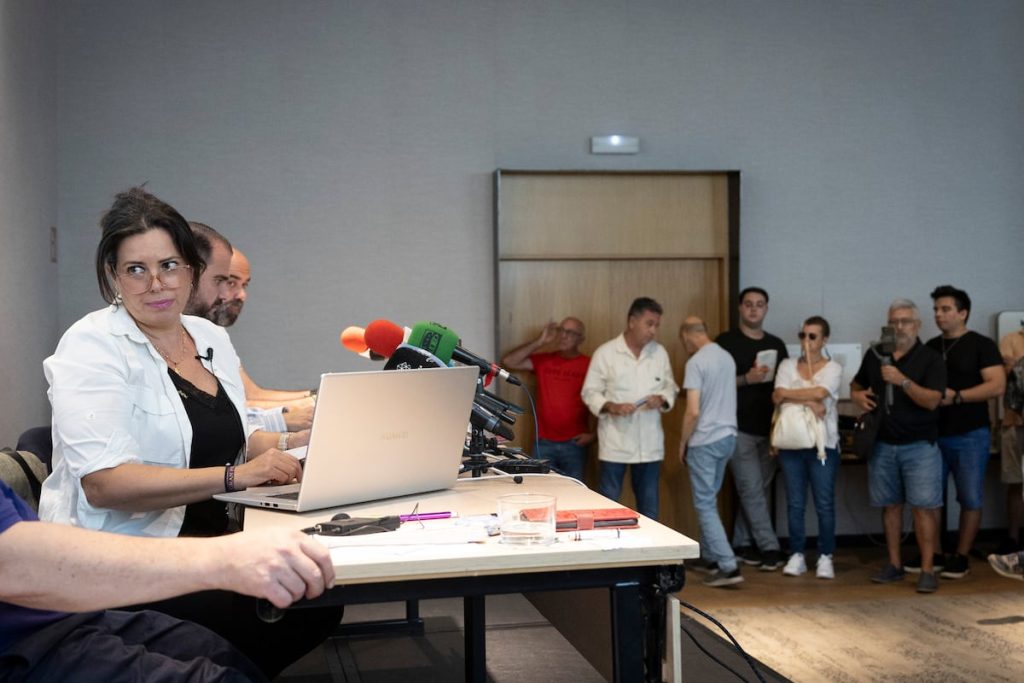The Civil Guard brigade María Serrano and the Unified Association of Civil Guards (AUGC) have denounced the alleged inaction of the Seville Command against alleged illegalities by a Corporal from the Seprona, who was supported by his superiors. After 30 years of service and 13 years of internal complaints within the armed institute, the sub-officer has publicly recounted the alleged irregularities, in a hotel in the Andalusian capital and before 200 people, invoking Law 2/2023 that protects whistleblowers of corruption cases since last year. These public denunciations of alleged corruption within the Civil Guard are not common, and even less so when they go viral on social media, given the military discipline that prevails in the Corps.
Serrano has detailed the police reports that reveal the alleged illegalities committed by Corporal Enrique Castillo from the Seprona of the Civil Guard, some of them linked to the municipal fish market Mercasevilla and others to vegetable oil recycling companies. All irregularities were allegedly ignored by the superiors of the Seville Command, including the former chief of said Command, Fernando Mora Moret, today a Major General and Chief of Staff of the armed institute who directs the main deployments of agents throughout the country. Mora Moret reported Serrano for false accusation and now the sub-officer, on sick leave and stationed in Zaragoza, faces a one-year prison sentence in a military trial that was supposed to start on September 17, but was indefinitely suspended.
“I am here to denounce the corruption in the Seprona [Nature Protection Service] of Seville by my former colleague Enrique Castillo Martín, and all the documentation is reflected here. I do not understand the impunity of this Corporal. I am supposed to feel protected and I am not. Since 2009, I reported various administrative infractions in reports, but my superiors buried me alive. And yes, I would do it again,” she said about the successive disciplinary proceedings opened against her by her superiors. Serrano maintains that Corporal Castillo, who remains assigned to the Seprona in the province of Seville, turned a blind eye to not sanctioning waste companies of vegetable oils, whose discharges pose a danger to public health, as well as fish wholesalers with irregular merchandise who attended the fish market in the Andalusian capital, Mercasevilla.
Why didn’t she go to Internal Affairs? “I did not have access to them, I was obliged to send the facts to my direct superiors,” argued Serrano. After ignoring the commands her internal complaints, Serrano claims that the former chief of the Seville Command and Major General Mora More humiliated her for half an hour with constant shouting in front of two other senior officers. After two cross-complaints between the superior and the subordinate, she now faces a military trial following the dismissal of her complaint by General Laurentino Seña.
The AUGC has supported the testimony of the sub-officer and criticized the government for still not establishing the internal channel for corruption complaints in the Civil Guard, a measure required by the European Union since December last year. “The leadership responds that they are working on the internal channel, but we are still waiting eight months later. Furthermore, the collegiate body that must endorse these complaints cannot be composed only of superiors, we demand that the associations be present. What complaints will the agents send if they know they affect the superiors?” protests Germán Gómez, Secretary of Organization of AUGC. Gómez equates Serrano’s case to other corruption cases in the armed institute such as that of Lucía Garrido in Malaga.
The key lies in the reform of the government of Rajoy, which in 2015 established that certain behaviors in the Civil Guard, such as insubordination, could be judged under the Military Penal Code – always, not only in times of war, as before – and not according to the Disciplinary Regime. Despite two protests by agents in Madrid, the government of José Luis Rodríguez Zapatero with Law 12/2007 eliminated the arrest sanction from the disciplinary regime and did not apply the military penal code to Civil Guards, Rajoy reversed that legal modification in 2015. “It is an anachronistic situation that represented a regression of rights for Civil Guards,” criticizes AUGC.
This newspaper contacted the Civil Guard to gather the opinion of the generals and the Corporal mentioned in the complaint, but they declined to comment. Sergio González, affected by alleged inhalation of toxic gases in Coria del Río (Seville), attended the press conference on Wednesday to criticize: “Where Corporal Castillo said there was nothing, I have been given total disability.” Serrano has stated that only one of the internal complaints was investigated by the Court of Instruction 2, which was shelved because the superiors allegedly delayed reporting it to the justice system in order to have them archived, as the judge did not see a continuous crime. The sub-officer reported Corporal Castillo for allegedly agreeing with producers not to monitor vegetable waste, knowing that they would pollute the rivers, among other crimes. Simultaneously, she reported him to the court for writing appeals for the companies against the sanctions he himself imposed. The Judicial Police found the appeals on the Corporal’s computer hard drive, and witnesses identified him as the author of the exculpatory writings. However, the justice system acquitted the Corporal due to prescription, according to Serrano.


